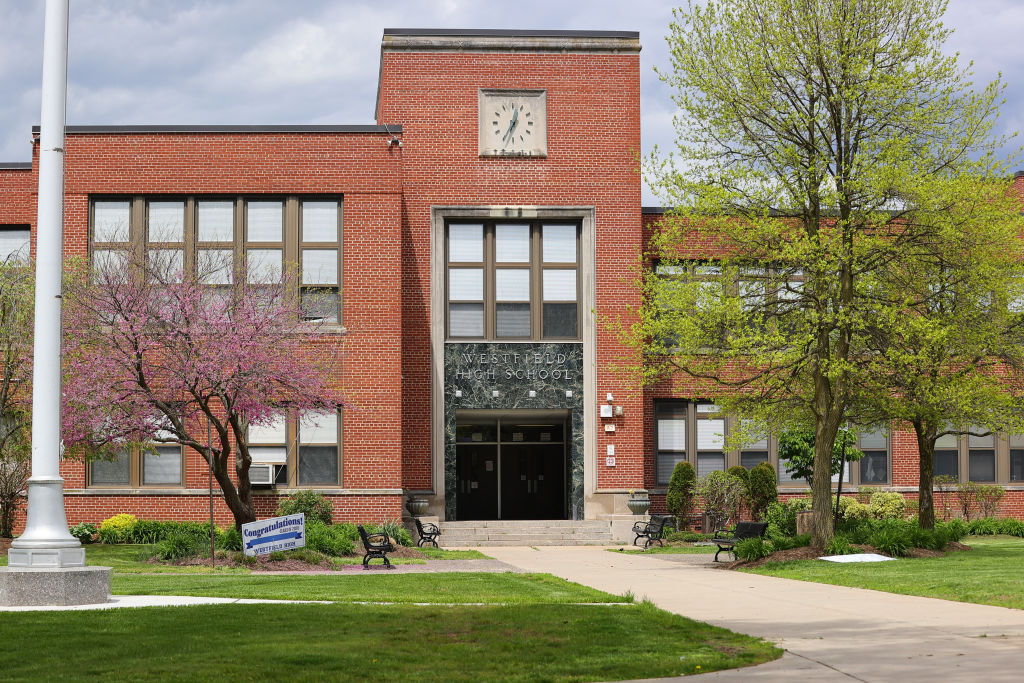This October, boys at Westfield High School in New Jersey started acting "weird," the Wall Street Journal reported. It took four days before the school found out that the boys had been using AI image generators to create and share fake nude photos of female classmates. Now, police are investigating the incident, but they're apparently working in the dark, because they currently have no access to the images to help them trace the source.
According to an email that the WSJ reviewed from Westfield High School principal Mary Asfendis, the school "believed" that the images had been deleted and were no longer in circulation among students.
It remains unclear how many students were harmed. A Westfield Public Schools spokesperson cited student confidentiality when declining to tell the WSJ the total number of students involved or how many students, if any, had been disciplined. The school had not confirmed whether faculty had reviewed the images, seemingly only notifying the female students allegedly targeted when they were identified by boys claiming to have seen the images.
It's also unclear if what the boys did was illegal. There is currently no federal law restricting the creation of faked sexual images of real people, the WSJ reported, and in June, child safety experts reported that there was seemingly no way to stop thousands of realistic but fake AI child sex images from being shared online.
This week, President Joe Biden issued an executive order urging lawmakers to pass protections to prevent a wide range of harms, including stopping "generative AI from producing child sexual abuse material or producing non-consensual intimate imagery of real individuals." Biden asked the secretary of Commerce, the secretary of Homeland Security, and the heads of other appropriate agencies to provide recommendations regarding "testing and safeguards against" producing "child sexual abuse material" and "non-consensual intimate imagery of real individuals (including intimate digital depictions of the body or body parts of an identifiable individual), for generative AI." But it could take years before those protections are ultimately introduced, if ever.
Some states have stepped in where federal law is lagging, with Virginia, California, Minnesota, and New York passing laws to outlaw the distribution of faked porn, the WSJ reported. And New Jersey might be next, according to Jon Bramnick, a New Jersey state senator who told the WSJ that he would be "looking into whether there are any existing state laws or pending bills that would criminalize the creation and sharing of" AI-faked nudes. And if he fails to find any such laws, Bramnick said he planned to draft a new law.
It's possible that other New Jersey laws, like those prohibiting harassment or the distribution of child sexual abuse materials, could apply in this case. In April, New York sentenced a 22-year-old man, Patrick Carey, to six months in jail and 10 years of probation "for sharing sexually explicit 'deepfaked' images of more than a dozen underage women on a pornographic website and posting personal identifying information of many of the women, encouraging website users to harass and threaten them with sexual violence." Carey was found to have violated several laws prohibiting harassment, stalking, child endangerment, and "promotion of a child sexual performance," but at the time, the county district attorney, Anne T. Donnelly, recognized that laws were still lacking to truly protect victims of deepfake porn.
"New York State currently lacks the adequate criminal statutes to protect victims of ‘deepfake’ pornography, both adults and children," Donnelly said.
Remarkably, New York moved quickly to close that gap, passing a law last month that banned AI-generated revenge porn, and it appears that Bramnick this week agreed that New Jersey should be next to strengthen its laws.
"This has to be a serious crime in New Jersey," Bramnick said.
Until laws are strengthened, Bramnick has asked the Union County prosecutor to find out what happened at Westfield High School, and state police are still investigating. Westfield Mayor Shelley Brindle has encouraged more victims to speak up and submit reports to the police.


